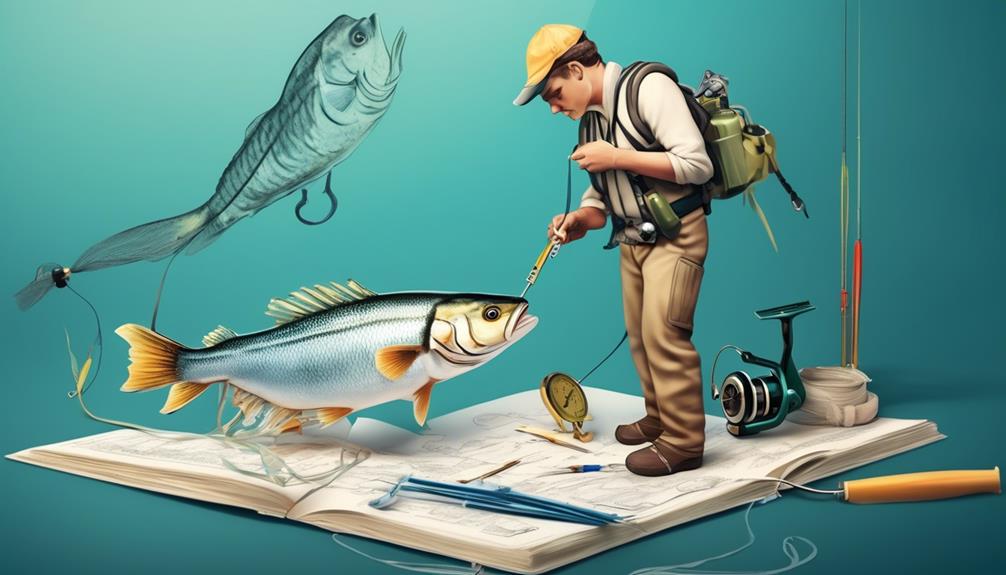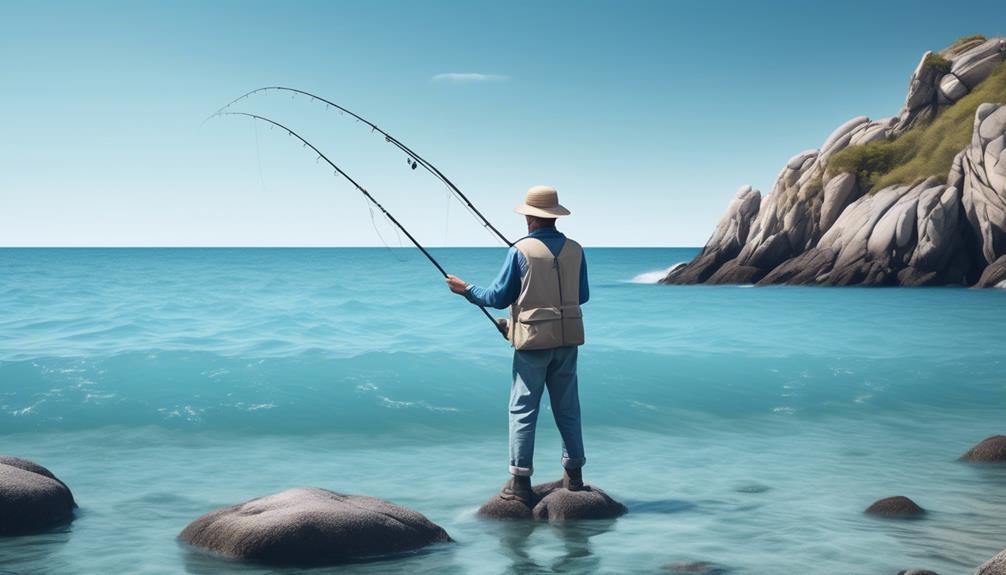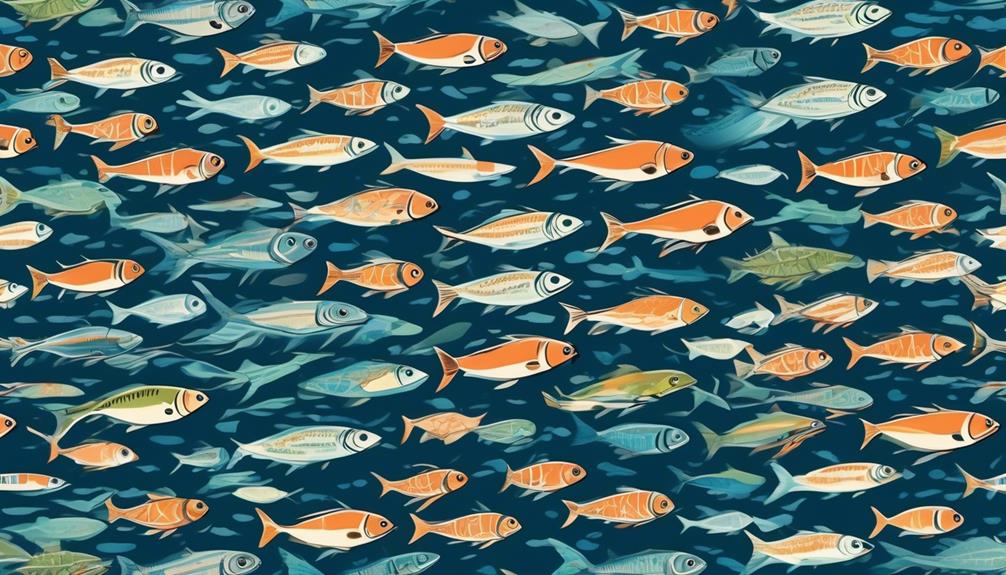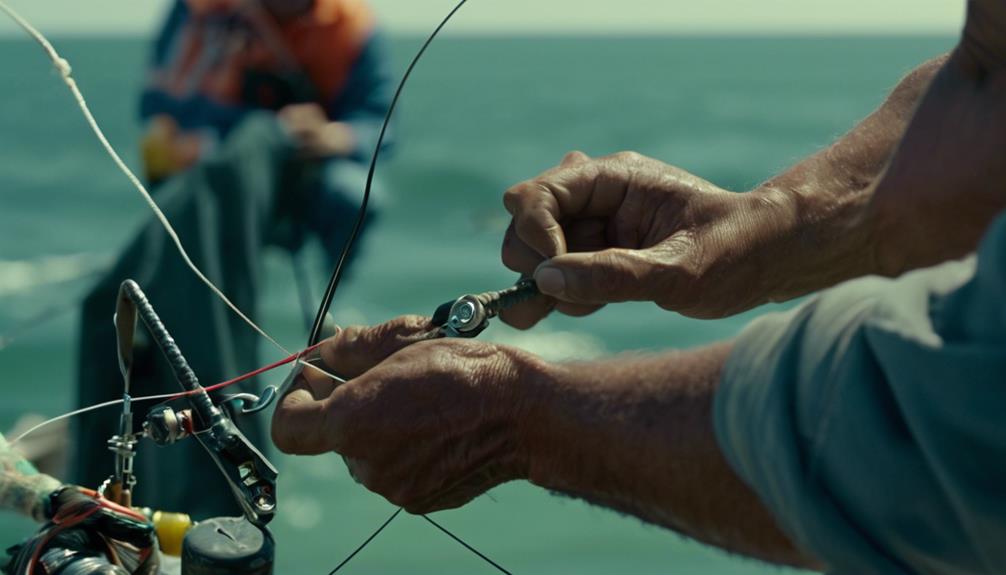When it comes to saltwater fishing, the vastness of the ocean can be both thrilling and daunting. You may find yourself drawn to the idea of reeling in a big catch against the backdrop of crashing waves, but where do you even begin?
Well, the basics of starting saltwater fishing involve understanding the unique challenges and opportunities that come with fishing in the ocean. From selecting the right gear to mastering essential techniques, there's a lot to consider.
And once you've got the hang of it, the rewards can be truly exhilarating.
Understanding Saltwater Fishing Basics
If you're new to saltwater fishing, understanding the basics is essential for a successful and enjoyable experience on the water. When it comes to saltwater fishing equipment, it's crucial to have the right gear for the type of fishing you plan to do. For beginners, a versatile rod and reel combo that can handle a variety of saltwater species is a good starting point. Look for equipment specifically designed for saltwater use to avoid corrosion and damage from the harsh marine environment. Additionally, having a variety of hooks, sinkers, and lures will give you options for different fishing conditions and target species.
Saltwater fishing techniques can vary depending on the location, target species, and time of year. One of the most important techniques to master is properly baiting your hook. Whether you're using live bait or artificial lures, knowing how to present your offering in a way that entices fish to strike is essential. Additionally, understanding how to tie strong knots and set up rigs for different types of fishing will greatly improve your chances of success.
Learning to cast effectively and accurately, as well as how to handle and safely release caught fish, are also crucial skills to develop for a fulfilling saltwater fishing experience. As you gain more experience, you can explore advanced techniques such as trolling, bottom fishing, and using specialized rigs for specific saltwater species.
Selecting the Right Fishing Gear
When selecting the right fishing gear for saltwater fishing, it's important to consider the specific needs of the type of fishing you plan to do. For rod selection, look for a saltwater-specific rod that can handle the larger and more powerful fish found in saltwater. A medium-heavy to heavy rod is ideal for most saltwater fishing, providing the strength needed to handle larger fish and the versatility to handle a variety of fishing techniques.
When it comes to reel options, consider a spinning reel for its ease of use and versatility. Look for one with corrosion-resistant materials as saltwater can be harsh on equipment.
As for saltwater bait and tackle choices, it's essential to have a selection of lures and baits that mimic the prey commonly found in saltwater. This could include various jigs, soft plastic baits, and topwater lures. Additionally, having a variety of tackle such as hooks, sinkers, and swivels is crucial for adapting to different fishing conditions.
It's also important to invest in high-quality lines and leaders specifically designed for saltwater fishing, as the corrosive nature of saltwater can weaken standard lines over time.
Identifying Saltwater Fishing Hotspots
To locate prime saltwater fishing hotspots, consult local fishing reports, experienced anglers, and online resources for current information on productive fishing areas. When identifying saltwater fishing hotspots, consider the following important factors:
- Finding Bait: Look for areas where baitfish congregate, such as near structures like jetties, piers, or rocky outcrops. Predatory fish often gather where there's an abundance of baitfish, making these areas prime fishing hotspots.
- Navigating Tides: Understanding the movement of tides is crucial for identifying saltwater fishing hotspots. During incoming tides, baitfish and other prey are carried into shallower areas, attracting predatory fish. Conversely, outgoing tides can create prime feeding opportunities for fish as they follow the movement of the water.
- Underwater Structures: Hotspots often include underwater structures like reefs, wrecks, and drop-offs. These areas provide shelter for fish, making them ideal places to fish. Researching nautical charts or using fishfinder technology can help you locate these productive spots.
- Local Knowledge: Tap into the expertise of local anglers and charter captains who've intimate knowledge of the area. They can provide insider tips on the best fishing hotspots based on current conditions and fish behavior.
- Online Resources: Utilize online forums, fishing websites, and social media groups to gather information on productive fishing areas. These resources often provide real-time updates on recent catches and hotspots, helping you plan your fishing trip more effectively.
Learning Essential Saltwater Fishing Techniques
Once you've identified the prime saltwater fishing hotspots, mastering essential fishing techniques will significantly enhance your chances of a successful and rewarding fishing experience. When it comes to saltwater fishing, casting techniques and bait selection are crucial skills to develop.
Proper casting techniques involve the ability to accurately and efficiently cast your line into the water, allowing you to reach the desired fishing spots and increasing the likelihood of attracting fish. Practice different casting methods, such as overhead casting, side casting, and pitching, to adapt to various fishing conditions and environments.
Equally important is the selection of bait. Different saltwater species have varying preferences when it comes to bait, so understanding the type of fish you're targeting is essential for successful fishing. Live bait, such as shrimp, squid, or fish, is often favored by many saltwater species, while artificial lures can also be effective in certain situations. Experiment with different types of bait to determine what works best for the fish you aim to catch.
Furthermore, as an ethical angler, it's important to familiarize yourself with catch and release practices and contribute to conservation efforts. Always handle fish with care to minimize harm, and release them back into the water promptly. Additionally, support conservation initiatives aimed at preserving marine ecosystems and the sustainability of fish populations.
Understanding Saltwater Fish Species
Understanding the characteristics and behaviors of various saltwater fish species is essential for increasing your fishing knowledge and improving your ability to target specific types of fish. Fish identification is a crucial skill that allows you to recognize different species and understand their habits.
Additionally, being aware of fishing regulations for specific fish species in your area is important for staying compliant and helping to conserve the marine environment.
When it comes to understanding saltwater fish species, there are several key factors to consider:
- Physical Features: Learning to identify fish based on their physical characteristics, such as body shape, fin placement, and coloration, can help you differentiate between species.
- Habitat and Behavior: Understanding the specific habitats and behaviors of different fish species can aid in locating and targeting them effectively.
- Feeding Patterns: Knowing the feeding preferences of various fish species can help you choose the right bait and lures for a successful fishing trip.
- Size and Growth: Being aware of the typical size and growth rate of different fish species can assist in determining the best fishing practices and gear to use.
- Conservation Status: Familiarizing yourself with the conservation status of saltwater fish species can guide you in making responsible decisions while fishing and help protect vulnerable populations.
Tackling Common Saltwater Fishing Challenges
If you're ready to conquer common challenges in saltwater fishing, arming yourself with practical strategies and techniques will be key to enhancing your angling experience. When handling rough waters, staying safe is paramount. Ensure that your boat is well-equipped with safety gear such as life jackets, flares, and a first aid kit. Keep a close eye on weather forecasts and always inform someone about your fishing plans. It's also crucial to familiarize yourself with the navigation rules and have a reliable means of communication, such as a VHF radio.
Dealing with saltwater fish behavior and mastering hooking techniques is essential for a successful fishing trip. Understanding the behavior of different species will give you an edge. Research specific fish tendencies and feeding habits to adjust your approach accordingly. When it comes to hooking techniques, using the right bait and adjusting your hook size can make a significant difference. Pay attention to the movement of the fish and be patient when setting the hook.
Additionally, consider the impact of tidal movements and currents on fish behavior, as these factors can influence where and how fish feed.
Adhering to Saltwater Fishing Regulations

Make sure to familiarize yourself with the saltwater fishing regulations in your area before heading out on your angling excursion. Adhering to saltwater fishing regulations is crucial to ensure the sustainability of marine life and to avoid legal repercussions. Here are some key points to consider:
- Legal Requirements: Familiarize yourself with the specific rules and regulations governing saltwater fishing in your area. This includes obtaining the necessary permits or licenses, adhering to size and bag limits for different species, and understanding any restricted or prohibited fishing areas. Failure to comply with these legal requirements can result in fines or penalties.
- Conservation Efforts: Saltwater fishing regulations are designed to support conservation efforts and protect the marine ecosystem. This may include seasonal fishing closures to protect spawning grounds or vulnerable species, as well as gear restrictions to minimize bycatch and habitat damage. By following these regulations, you contribute to the sustainability of marine resources for future generations.
- Reporting Requirements: Some regions require anglers to report their catch, including species, size, and quantity. Complying with these reporting requirements helps fisheries management authorities gather valuable data for stock assessments and sustainable resource management.
- Safety Regulations: In addition to fishing-specific regulations, ensure you're aware of any safety requirements, such as carrying safety equipment, maintaining proper distances from other vessels, and adhering to navigation rules.
- Local Guidelines: Stay informed about any additional local guidelines or specific regulations that may apply to the area where you plan to fish. This could include rules related to bait usage, fishing methods, or protected marine areas. Always respect and follow these local guidelines to ensure responsible angling practices.
Embracing Saltwater Fishing Etiquette
Embrace proper saltwater fishing etiquette by respecting other anglers' space and being mindful of their fishing activities. When on a boat, it's essential to observe proper boat etiquette. This includes maintaining a safe distance from other vessels, steering clear of their fishing lines, and keeping noise to a minimum to avoid disrupting the fishing experience of others. Always be considerate of fellow anglers and their right to enjoy the waters without unnecessary disturbances.
Responsible catch and release practices are also crucial in saltwater fishing etiquette. If you're practicing catch and release, handle the fish with care to minimize stress and injury. Use barbless hooks to facilitate easy and safe release, and avoid overplaying the fish, which can exhaust it to the point of being unable to recover after release. Additionally, be mindful of the fish's environment by avoiding areas where they may be spawning or congregating in large numbers.
Incorporating these etiquette practices into your saltwater fishing routine contributes to a more enjoyable experience for everyone on the water. By demonstrating respect for other anglers, their space, and the marine environment, you contribute to a positive fishing community and help preserve the natural resources for future generations.
Frequently Asked Questions
What Are Some Common Safety Precautions to Take When Saltwater Fishing?
When saltwater fishing, it's crucial to prioritize safety. Always wear proper safety gear, such as a life jacket and sun protection. Know emergency procedures, like how to use a VHF radio or distress signals, to stay prepared.
How Do Tides and Currents Impact Saltwater Fishing and How Can I Work With Them?
When fishing in saltwater, tidal patterns greatly impact fishing techniques. Understanding how currents affect fish behavior will help you work with them. Pay attention to tides for better catches and adjust your fishing approach accordingly.
What Are Some of the Best Methods for Preserving and Storing Saltwater Fish After Catching Them?
To properly handle saltwater fish after catching, you should keep them cool and moist with ice. The ideal storage techniques include gutting and cleaning the fish before placing them in a cooler with ice.
Are There Any Specific Techniques for Catching Certain Saltwater Fish Species?
To catch specific saltwater fish species, consider their behavior and habitat. Use the right gear, bait selection, and casting techniques tailored to each fish. Understanding their patterns will improve your success.
What Are Some Tips for Handling and Releasing Fish in a Way That Minimizes Harm to Them?
To minimize stress on the fish and ensure proper handling, always wet your hands before touching the fish, use barbless hooks, and avoid touching the gills. Support the fish in the water until it swims away on its own.
Conclusion
So, now that you have the basics of saltwater fishing down, it's time to grab your gear and hit the water.
Remember to always follow regulations, respect the environment, and practice proper etiquette.
With the right techniques and a bit of patience, you'll be reeling in that big catch in no time.
Good luck out there!



